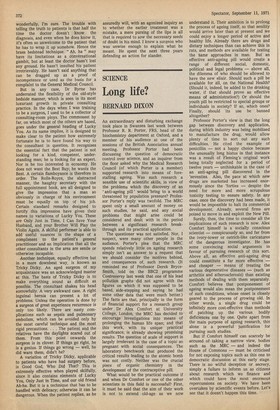SCIENCE
Long life?
BERNARD DIXON
An extraordinary and disturbing exchange took place in Swansea last week between Professor R. R. Porter, FRS, head of the biochemistry department at Oxford, and a member of his audience at one of the sessions of the British Association annual meeting. Professor Porter had been discussing the question of democratic control over science, and an inquirer from the floor asked why the Medical Research Council (of which Porter is a member) supported research into means of forestalling ageing. Was such research a sensible use of scientific skills, in view of the problems which the discovery of an 'anti-ageing pill' would 'bring to a world threatened by population pressure? Professor Porter's reply was twofold. The MRC .spent only a small amount of money on such studies, he said, and any social problems that might arise could be considered and dealt with in the period between a significant research breakthrough and its practical application.
The questioner was not satisfied. Nor, I suspect, were many other people in the audience. Porter's plea that the MRC spends relatively little on ageing research simply isn't an answer to a request that we should consider the motives behind, and consequences of, such research. (It reminded me of Professor Derek BryceSmith, told on the BBC2 programme Controversy last week that one of his lead pollution graphs did not agree with the figures on which it was supposed to be based, side-stepping and saying he had some other data that were much better.) The facts are that, principally in the form of financial support for a research group under Dr Alex Comfort at University College, London, the MRC has decided to encourage investigations into means of prolonging the human life span; and that this work, with its unique practical significance, is already showing promising results. The question of scale of support is largely irrelevant in the case of a topic so pregnant with social consequences. The laboratory benchwork that produced the critical results leading to the atomic bomb was not costly. Neither was the crucial piece of organic chemistry in the development of the contraceptive pill.
What would be the practical outcome if and when Dr Comfort or one of the other scientists in this field is successful? First, it must be said that the aim of their work is not to extend old-age as we now understand it. Their ambition is to prolong the process of ageing itself, so that senility would arrive later than at present and we could enjoy a longer period of active and healthy life. Already there are drugs and dietary techniques than can achieve this in rats, and methods are available for testing the Same approaches in man. But an effective anti-ageing pill would create a range of different social, domestic, political and legal problems — above all, the dilemma of who should be allowed to have the new elixir. Should such a pill be available for all, on the National Health? (Should it, indeed, be added to the drinking water, if that should prove an effective means of administration?) Or should the youth pill be restricted to special groups or individuals in society? If so, which ones? Finally, should its use be banned altogether?
Professor Porter's view is that the long gap between discovery and application, during which industry was being mobilised to manufacture the drug, would allow plenty of time to sort out any such difficulties. He cited the example of penicillin — not a happy choice because the unusually long hiatus in that instance was a result of Fleming's original work being totally neglected for a period of twelve years — unthinkable in the case of an anti-ageing pill discovered in the 'seventies. Also, the pace at which new drugs are marketed has increased enormously since the 'forties — despite the need for more and more scrupulous toxicity testing to ensure safety. In any case, once the discovery had been made, it would be impossible to halt its commercial development. Already, several firms are poised to move in and exploit the New Pill.
Surely, then, the time to consider all the implications of such research is now. Alex Comfort himself is a socially conscious scientist — conspicuously so, and far from the ivory-tower or ostrich-like caricatures of the dangerous investigator. He has some convincing social arguments in favour of pursuing research of this sort. Above all, an effective anti-ageing drug could constitute a far more effective — and cheaper — means of treating the various degenerative diseases — (such as arthritis and atherosclerosis) than existing methods of dealing with them separately. Comfort believes that postponement of ageing would also mean the postponement of such conditions, whose onset is closely geared to the process of growing old. In other words, a single drug could be infinitely more cost-effective than methods of patching up the various bodily deficiences one by one. Quite apart from the main purpose of ageing research, this alone is a powerful justification for pursuing such studies.
But if Comfort himself can scarcely be accused of taking a narrow view, bodies such as the MRC — and indeed the House of Commons — must be criticised for not exposing topics such as this one to democratic discussion at this early stage. There is no wilful deception or secrecy, simply a failure to inform us as citizens about research which we finance and which could have the most enormous repercussions on society. We have been overtaken by scientific events before. Let's see that it doesn't happen this time.










































 Previous page
Previous page